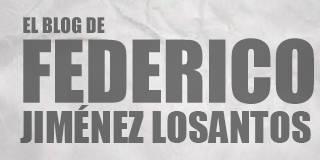On Thursday, December 1st, my latest book goes on sale: The lynching, whose subtitle is "From the liquidation of COPE to the adventure of esRadio". It could also have been subtitled "The comatose state of freedom of expression in Spain" or "The hardest and most decisive episode of ideological struggle of the years of Zapaterismo", but the struggle –in reality, a war of positions, with trenches, barbed wire and mustard gas as incense - took place inside and outside COPE for almost three years; and, as the result of our defeat was the happy birth of esRadio, an explanatory subtitle is clearer if less brilliant or loud. However, the adventure is only one and almost timeless: that of freedom, so feeble, against its stout enemies, and it goes from that "miracle of COPE" that I recounted in Overnight, to the last chapter of The lynching, which recounts things from a few weeks ago.
El Mundo pre-publishes this Sunday two fragments of which I only know one, the one about lunch with Cañizares last fall in the Vatican (one of my favorite passages), but I see that in LD Pablo Planas he has advanced a day -the vice of journalism is to get ahead- with the fragment of a chapter dedicated to what, seen from today, is the most sordid of all The Lynching: the revenge of the police officers involved in terrible irregularities and alleged crimes to manipulate the evidence of the 11 M. And after reading the preview of LD I have to do what I had forbidden myself: read and write one more word about the book that has cost me the most to write in my entire life. And I have written -and they have cost me- a few.
Apparently, what LD publishes –fragment of a much larger chapter- is the minor misdeed of a minor character that would not deserve a single sentence if it were not part of something much larger and more sinister: the amalgamation of political interests and journalists who used and still use the 11M massacre to get close to the political cover-ups and page turners of the massacre, who are all of the Left and a good part of the Right. The formula used is the usual one: attack those who criticize the powerful who want to flatter. I have read on this blog that a few days ago Javier Algarra, Federico Quevedo and Enrique de Diego put on a ferocious little act on Intereconomía TV against Pedro J. and against me, for a tremendous crime that I would regret not having committed: not supporting Rajoy when, on the shoulders and paellas of Camps, gave the change in Valencia after the defeat in 2008. That is, when he threw out María San Gil, Ortega Lara, Acebes and Zaplana; and miraculously he did not fire Esperanza Aguirre, although he announced it in Elche, the neo-homeland of Enrique De Diego: "they go to the liberal party or the conservative party," he said. As if the PP were anything else!
Since then, in a short time, it has rained a lot, Spain has been completely ruined and the catastrophic economic management of the PSOE and the ruinous electoral campaign of Rubalcaba, along with Rajoy's strategy of invisibility in all delicate matters, particularly in the electoral debate on TV –Peasant, corruption, 11M, judicial politicization, Catalan Statute, compromise with ETA- they have led the PP to its second absolute majority. However, in the Basque Country, so important politically and morally for the party - don't forget, Miguel Ángel Blanco - the PP has suffered an unmitigated catastrophe. It has neither gained seats nor stopped losing votes since the despicable expulsion of María San Gil and the imposition of the zigzagging line of Basagoiti and Oyarzábal. If the Trío Algarrobo – as they are called within Intereconomía – had waited a few days to leave El Linchamiento, they would have had more and better material to serve the sewers of the Interior and the garbage cans of Genoa. However, I hope that their effort is valued as and how much they want.

The fundamental issues of the book
But let's go to the book and avoid trifles. From the first chapter, dedicated to the King's attack against COPE and against me, stopped by Aguirre and published by El País the last time it printed a million copies, to the pre-agreement with Vocento to associate Punto Radio and our network this September, In El lynching there is much and detailed talk about journalism and politics, media wars and bellicose peace, the daily apocalypse that the world of information and opinion lives through, mediated to nausea by the ruling caste. The bizarre relations with Unedisa and Intereconomía –apart from the sordid but minuscule episode of the algarrobía– are, or so I think, quite entertaining. And the run-ins with other journalists – from Luis del Olmo, with whom I started on the radio when I was relatively young and looked like a complete kid (a photo in the book shows it), to the Ku-Klux-Klan of Prisa and La Sixth, plus the infinite nationalist and award-winning media – are, or seem to me, most revealing. I'm not talking about the permanent campaign against COPE and especially against me on its television wheels and radio donkeys, because I am on an audiovisual diet of everything that seriously alters human sensitivity. If someone is encouraged, they will tell.
There are infinitely worse aspects of "lynching." The most serious is the use of Justice to achieve what the Ku-Klux-Klan could not: finish us off and, if possible, put us in jail. It can be seen in the chapters dedicated to Gallardón, Cebrián and Zarzalejos, of which there is perhaps limited news, and in the penultimate chapter with the sentences of some judges –the cases of ERC, Fanlo and Ruiz– revoked by other much older judges. fair – in my opinion, of course, but I think that the court rulings show it. In the end, they have acquitted me of practically everything they had sentenced me to, except for the most unfair and illegal of all: the Gallardón case; but no one will ever compensate me for what they judged me, strictly speaking, lynched. The cover-up of 11M, which winds throughout the book, from beginning to end, and the continuous manipulation of Justice by unscrupulous politicians and the media are the darkest aspects of the book. But that's how they were and how they were I tell them.
Clerical intrigues inside and outside COPE
There are things in the book that are much more fun, because in these years everything has happened. For example, the betrayals of the PP are more illuminating if they are told by Nacho Villa; what we still don't know about 11M no one can relate like Luis del Pino; the construction, step by step but at full speed, of esRadio for 7 at 7 could only be told by Javier Somalo; and nothing would have better fulfilled the role of the blog of Father Bru, our mischievous private inquisitor, as a forum for the struggle between two ideas of the Church or two sides of Spanish Catholicism. Nor could I have imagined –I think anyone else– the surprising and endearing contributions of the exorcist Padre Fortea's blog. Not even the COPE crisis had journalism created a new genre, the twin of the tocomocho scam: the "half real, half imagined" chronicle of ex-priest Vidal in "Digital Religion." I have read few more delusional and hilarious things than the supposed transcript of the conversation between Bertone and Monteiro the day the Vatican Secretary of State arrived in Madrid, supposedly to decide the fate of COPE, which, according to Vidal, had already been decided. The dialogue of a guy who doesn't speak Spanish and another who understands it with difficulty commenting on what I say at six in the morning is an airy troll, a journalistic scam, but, after three or four years, it's half embarrassing, half hilarious.
The reasons for the political campaign against COPE, the decisive role of the post-2008 PP and Coronel de Palma, why I stayed when I wanted to leave and why I left after receiving a great offer so that César and I we stayed, Rouco's perhaps ultimate reason for giving up the square, Barriocanal's determination to prevent our departure, the betrayal and fall –at least at the microphone– of Nacho Villa, the unsuccessful advent of Burua, in short, the thousand and one I think the tragic and tragicomic adventures of recent years will provide the reader of El lynching with the entertainment they deserve and for which, in advance, I thank you. There are things that seem to have happened centuries ago and are from months ago. There is a radio in which we went a lot, we suffered a lot, but from which, as a whole, I keep an emotional and grateful memory, because we did great good things that we could only do there. And there is a new radio, esRadio, which has just been born but already has a lot of life behind it and a lot ahead of it. The extensive photo booklet dedicated to those who make and make our channel's programs possible every day has turned out very well. The DVD that accompanies the book, an hour that includes the most emotional fragments of my last day at COPE, the awards and controversial speeches or the infamous trials -recordings rescued by LDTV-, I recommend it, even if I did not want to see it . I've had enough to live it and tell it: six hundred pages!
If there are no legal or technical difficulties, on the 1st, at seven past seven in the afternoon, Libertad Digital will post a documentary annex with many more photos that did not fit in the booklet or were only valid for the internet and with the sentences convictions and acquittals of this six-year judicial ordeal that I have managed to survive and that, in essence, I have been able to recount. In the worst moments, which have not been few, the support of some regular followers of this blog has helped me a lot and I am very sincerely grateful. In reality, reading LD, watching LDTV and listening to esRadio is the best reward that this black boy from Alabama, actually white and from Teruel, could dream of when he was surrounded by the Ku-Klux-Klan sayons. That lynching was partially successful but, in the end, it failed. I hope The Lynching has some success. If not the author, the story deserves it.


